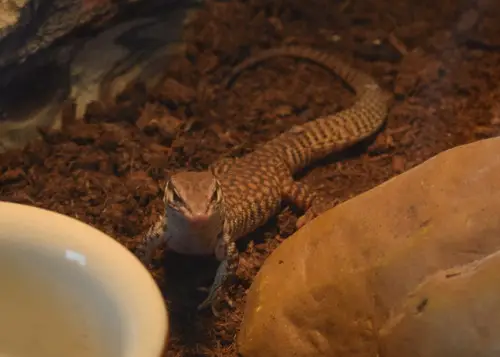Do red ackie monitor lizards bite? The red ackie, also known as spiny tailed, is a type of monitor lizard. They originate from Australia and are small (in terms of monitor lizard sizes). An adult lizard can grow up to 71 centimetres. The red ackie got its’ name from the spikes on its’ tail and its red colour.
They lead a relatively active lifestyle, compared to other reptiles. They can live anywhere between fifteen to twenty years, so caring for one requires commitment in time as well as money. We don’t recommend this lizard to novice pet owners because they require more care and thrive in certain conditions.
However, they are still considered on the most popular monitor lizards and are relatively easy to handle. But the question always arises from new potential owners, do red ackies bite and if so does it hurt?
Well we are going to give you all of these answers and ways in which you can reduce the chances of a bite.
Do Red Ackie Monitor Lizards Bite?
Do red ackie monitor lizards bite? Yes, they do. Their teeth are small but sharp and their jaws are incredibly strong, meaning they can cause nasty injuries. They also have claws that can scratch you. However, it is namely their more aggressive nature that makes them a pet with higher risk. They have the tendency of lashing out against those whom they deem as a threat.
They may be kept by experienced reptile owners but cannot be tamed the way a cat or dog can. Contrary to other types of lizards, they don’t really develop a sense of loyalty to their caregivers. They are best admired from afar than handled and manipulated.
Some monitor lizards are easier to have than others but are still more challenging than other species of reptiles. If you adopted one who was quite young, you can help them become familiar with human touch. Safe areas to pet them are under the chin, the back and behind the ears.
Deep breathing indicates that they aren’t bothered by it but watch out for hissing and an inflating of the throat. They do not appreciate the affection and it’s best that you stop.

Do red ackie monitor lizards bite?
Does a Red Ackie’s Bite Hurt?
Do red ackie monitor lizards bite, does it hurt? After reading this about the red ackie, you may be wondering if their bite hurts. The answer is yes. It is quite painful, as their bite has also gone as far as crushing bones. The monitor lizard’s bite also carries venom. This is what causes the affected area to swell and bleed.
The venom isn’t fatal to humans, but it does contain crotamine. This is the poison that can be found in the venom of rattle snakes. It hurts and may make you feel sick. Fortunately, the venom has a very small dose of poison, so it won’t do any serious damage.
However, you should be careful of bacterial infection. But why the pain? A red ackie’s venom stops the clotting of blood and makes blood pressure drop. As a result, you’ll experience more discomfort from the bite.
In the wild, a red ackie will bite its’ prey and it will knock them out temporarily. Because of this, the red ackie isn’t recommended for those with small children or have other family pets aside from the lizard.
What about its’ claws and tail? They are the monitor lizard’s additional defensive mechanisms. The claws are used for hunting because of their sharpness and strength. Their tail is also muscular and when lashed out, it can act like a whip. In the wild, it is used to incapacitate their next meal or the enemy.
Why Might a Red Ackie Bite You and How Can You Avoid it?
If your red ackie bites you, try not to take it personally. This reptile species doesn’t feel any attachment to its’ owner. They communicate via movement and posture. They don’t have good hearing, so they rely on their other senses to guide them. If you approach them slowly with no sudden gestures, it may be curious, and you can pet it.
What might be a reason why your red ackie has bitten you?
It may feel threatened by you and has acted accordingly.
One way to avoid being bitten is understanding your pet’s behavioural patterns. Let’s examine the way they defend themselves. An adult lizard may choose to stay completely immobile and suddenly flee. They are very quick on their feet and will seize the first opportunity that presents itself to hide.
When confronted, however, they will appear larger in size by puffing out. They may hiss or sway from one side to the other. If your pet is doing this, they perceive you as a predator and are trying to intimidate you. If you still try to reach out to them for handling, they might open their mouth wide. That is the final warning before they lunge forward.
What to Do if Your Red Ackie Does Bite You?
Did you get bitten by your pet lizard? Wash your hands. The red ackie carries disease like salmonella. That is due to the decaying of meat stuck in its’ teeth. If your pet has a wound in their mouth, bacteria can infect it. If a rash begins to develop, this is normal. It should go away within 24 hours.
Dependant on the size of your red ackie and also other variables such as the victims age and size, wounds can be quite severe. So if the wound is bad it is best to visit your nearest ER or emergency services.
In Conclusion
Do red ackie monitor lizards bite? To conclude, the red ackie is not a good choice of reptile for beginners. However, it is a good pet if you wish to become more familiar with the handling and care of monitor lizards. They can bite and it is unfortunately painful. This can happen if your pet is feeling threatened or provoked.
The best way to approach it is by avoiding sudden movements. There are also certain parts of the red ackie’s body that feel good to your reptile when petted.
To avoid getting bitten, read your pet’s body language. If they are seeking to run and hide, are swaying their bodies or have their mouth gaping, it is best to leave them alone. Otherwise, it may defend itself using its’ sharp claws or strong tail.
If you do get bitten, wash your hands thoroughly with soap and water. It is painful and it may cause your skin to swell and bleed. And although their bite is venomous, it is too small of a quantity for it to be poisonous and fatal.
If you enjoyed reading this article why not check out some of the other pet lizard articles on this website by clicking this link.
